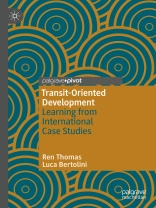This book uses international case studies to present insights on the policies, actors, and institutions that are critical to successful transit-oriented development (TOD). TOD has many potential benefits for cities and regions, and is considered a critical element in reshaping sprawling car-dependent urban regions into denser regions built around transit corridors. However, it is not a magic bullet solution for metropolitan transportation problems: challenges persist, such as displacement of local residents and regulatory barriers. How has TOD been successfully implemented? How can we integrate the positive aspects of TOD while minimizing its negative impacts?
This book presents a study conducted at the University of Amsterdam, exploring 11 international case studies, including a meta-analysis, rough set analysis and policy transfer workshops. The authors discuss the findings and present solutions to persistent challenges to transit-oriented development. Additional literature on e TOD (equitable TOD) strategies, as a fundamental component of planning for regional transportation, shows that these approaches can result in more collaborative processes, community-led development that minimizes the negative impacts of transportation infrastructure. As our Dutch colleagues stated, TOD can be considered a policy concept that can be used as a story to unite people.
Table des matières
1. Introduction to Transit-Oriented Development.- 2. Policy Learning: How Planners Learn from Each Other.- 3. International Case Studies in TOD.- 4. Persistent Challenges and Potential Solutions: Equitable TOD.- 5. Conclusion.
A propos de l’auteur
Ren Thomas is an Assistant Professor at the School of Planning at Dalhousie University, Canada
Luca Bertolini is a Professor at the Department of Geography, Planning, and International Development Studies at the University of Amsterdam, Netherlands












